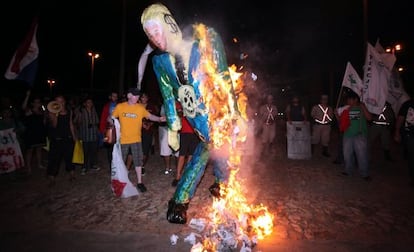Dictator's ghost still haunts Paraguay
Stroessner family's influence keeping victims from collecting compensation


History books in Paraguay say that former dictator Alfredo Stroessner died in August 2006 in Brasilia at the age of 93, after ruling the South American nation for 35 years with the backing of the Colorado Party, before being deposed in 1989.
Stroessner, an army general, gave refuge to dozens of Nazis, including the notorious Joseph Mengele, while human rights organizations claim at the same time that some 400 Paraguayans disappeared during his rule. Since then, no one in Paraguay has been brought to trial in connection with the repression or disappearances that took place.
His son, former Air Force General Gustavo Stroessner Mora, died of cancer a year ago in Asunción, avoiding prosecution on charges of illegally accumulating illicit wealth.
What the history books or the newspapers don't explain is how the Stroessner family obtained so much money.
Lawyer Mario Benítez Acuña estimates the Stroessner family's wealth at more than $5 billion (or 3.7 billion euros). Among the assets Benítez believes the late dictator's family has amassed are dozens of properties, companies and warehouses, all of which are listed under the Stroessner name. He hopes that one day Stroessner's victims and their families will be able to collect some kind of compensation from these holdings.
But Stroessner's influence continues to this day. Around 20 years ago, journalist Edgar Ruiz Díaz, of the Asunción daily Abc Color, sneaked into a courthouse and found dozens of secret files concerning Stroessner.
"I didn't take a camera, just my tape recorder, and I began to read all the files out aloud. That's how I found out that Stroessner had a lot of secret accounts in Switzerland. This is what the international community should investigate today," he said in a telephone interview.
Ruiz Díaz has spent half of his life trying to unravel the complex web of the Stroessner family fortune. He also holds hopes that one day those who suffered under the dictatorship will be able to collect some type of compensation.
"Gustavo Stroessner was only able to avoid trial on illicit wealth charges because the statute of limitations ran out; he left the country and when he came back 20 years had passed - and then he died. But that immense fortune doesn't belong to him. That money should go to compensate victims, but the problem is that there is a lot of fear in this country," he said.
The dictator's grandson - also named Alfredo Stroessner - is a senator for the Colorado Party who, according to Ruiz Díaz, holds a lot of power. "He controls a big part of the fortune he inherited and does all he can to stop any judicial investigation," the journalist says.
The first legal battle was initiated in 2004, when Geraldo José Osta Sarubbi hired lawyer Mario Benítez to file a claim against the aging former dictator for persecution and repression against his father, Captain Osta Mendoza. After the first filing, more victims came forward demanding compensation.
But the entire process was stopped when Stroessner died in Brazil on August 16, 2006, the victim of septic shock following an operation.
Later, the lawyer was able to connect Gustavo Stroessner to the money and filed lawsuits against him. But another grandson, Emanuel Manzar Stroessner, traveled from Brazil to Paraguay and put a stop to the inquiries.
Paraguay's leftist president, Fernando Lugo, has sided with the victims but hasn't been able to keep the cases alive.
Benítez said the decision to stop the proceedings was unconstitutional, and made by a judge who is a friend of Stroessner's daughter Graciela.
"Instead of recusing himself from the case, he dismissed it. Now it is almost impossible to continue," he said.
Tu suscripción se está usando en otro dispositivo
¿Quieres añadir otro usuario a tu suscripción?
Si continúas leyendo en este dispositivo, no se podrá leer en el otro.
FlechaTu suscripción se está usando en otro dispositivo y solo puedes acceder a EL PAÍS desde un dispositivo a la vez.
Si quieres compartir tu cuenta, cambia tu suscripción a la modalidad Premium, así podrás añadir otro usuario. Cada uno accederá con su propia cuenta de email, lo que os permitirá personalizar vuestra experiencia en EL PAÍS.
¿Tienes una suscripción de empresa? Accede aquí para contratar más cuentas.
En el caso de no saber quién está usando tu cuenta, te recomendamos cambiar tu contraseña aquí.
Si decides continuar compartiendo tu cuenta, este mensaje se mostrará en tu dispositivo y en el de la otra persona que está usando tu cuenta de forma indefinida, afectando a tu experiencia de lectura. Puedes consultar aquí los términos y condiciones de la suscripción digital.








































